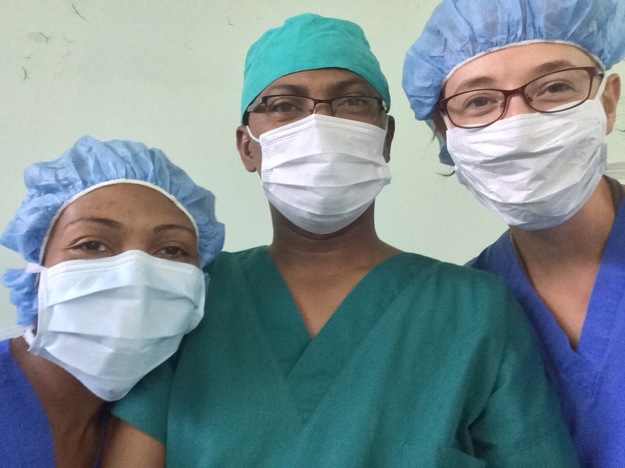How do you measure success?
What we see largely depends on what we look for, as Sir John Lubbock once noted, so this question was on my mind over the past fortnight as we have been going back to visit those hospital teams we worked with 3 to 4 months ago at the beginning of this Mercy Ships field service in Madagascar. We spent hours listening as 9 teams from different ends of the country told us about their experience of attempting to change working habits to integrate a completely new system into their every day practice.

Theatre team from Diego tell their stories
It has been an enormous privilege to hear stories from every site about the positive impact the training has had by introducing the Surgical Safety Checklist and vital monitoring equipment, with many places giving specific stories of lives that have been saved as a result.
One particularly small team said the habit of pausing together at critical stages of an operation to do the Checklist ‘feels like having an extra team member’ especially in emergencies, reassuring them they don’t miss something critical when under pressure.

The interactive ‘checklist’ board on out MAF light board on the MAF light aircraft. I resisted the urge to press the shiny buttons. They don’t let you sit up front again if you do that kind of thing.
Another team spoke passionately about how the safety of their patient has truly become the focus of all they do, how they experience a shared sense of responsibility for safety from every member in the team. Those who previously would never have spoken up feel free to raise questions or concerns, they notice greater efficiency in preparing and managing their resources because they communicate better… in short totally inspiring stuff!
Our department in the Mercy Ships team is concerned with ‘Medical Capacity Building’, so I was struck when I came across this answer to the question of how you measure your successes…..
‘Your success will be the degree to which you build up others who work with you. While building others, you build up yourself.’- James Casey
This answer to ‘what’ success means certainly resonated with me in this project which is all about empowering medical teams across Madagascar to work together to deliver high quality safe surgical care. I have also been reflecting on the ‘how’ you make this happen!
In some places, we were struck by how particular teams seemed to take this whole process in their stride! Not satisfied with what and how, we put the next obvious question to these guys; why have you found this so easy when some places find a change like this such a challenge? What is the secret of your team’s success? Any quick and easy top tips?!
The answer we got might surprise you, but after the 4th or 5th time we heard the same thing, it stopped surprising me.
‘You have to love one another.’
Love? Really?! Isn’t that a bit fluffy? Not really. English is one of those languages that seems rather limited by having just the one word to mean so many different things!
I love my Mum and I love chips.
Apparently Malagasy is the same! When you ask these guys exactly what they mean by ‘loving your team’, you can see why it has helped them succeed where some struggle. These are the sort of things they say:
Sharing information, mutual respect: Instead of everyone just looking to their own interests and getting on with their own specific role, they now consider how to work together towards a shared goal. Anaesthetists, surgeons, nurses, and support staff all share if they are aware of any potential difficulties or complications, so that everyone is ready to help in case of problems. Every member of the team has a voice and is included.
Shared responsibility and open communication. One surgeon commented that previously, if someone questioned or ‘checked’ what you had done, it could be perceived as criticism or bullying, whereas now they all realise the checklist helps them avoid making serious errors. It is not personal, but for the good of the patient and the better working of the whole team.
Again and again, ‘supporting each other’.

Dr Delbert (centre) says the secret of his team’s notable amicable atmosphere is their shared philosophy to ‘treat every patient like you would a member of your own family’
What makes people flourish? Lessons for life and teams
Professor Robert Waldinger is director of the Harvard Study of Adult Development, which is possibly the longest running study of it’s kind tracking the health, work, and home lives of over 700 men since 1938, and now studies their wives and over 2,000 children.
In his TED talk on the results of this extraordinary study, Professor Waldinger reports that in a recent survey of ‘Millennials’ (kids of the 80’s, 90’s, 00’s) over 80% stated that a major life goal for them was to get rich. More than 50% aimed to become famous. So what have the Harvard group concluded from all the tens of thousands of pages of information gathered over 7 decades about what keeps people healthy and happy?
Well, the lessons aren’t about wealth or fame or working harder and harder. The clearest message that we get from this 75-year study is this: Good relationships keep us happier and healthier.’
Not riches, not renown, but relationship. Waldinger goes on to emphasis it is not the quantity, but the quality of relationship that matters, that you can ‘really count on the other person in times of need’.
In fact, in Tamatave this week there was a leadership course for staff from the local hospital and the ship, starting with this same insight.
Là, ou il y a de l’amour, il y a de la vie – Where there is love, there is life.
It is easy to pay lip service in organisations to encouraging processes which improve safety and encourage improvement, such as ‘whistle-blowing’, or ‘reflective practice’ in which you can share and learn from mistakes or near misses. We all make mistakes all the time, to err is human after all! Another great TED talk by Dr Brian Goldman on mistakes in medicine can be found here. In reality, revealing our mistakes can be terrifying, especially when the stakes are high and perfectionism is endemic in our working cultures. It is easy to see why fear fostered by a culture of ‘blame and shame’ leads us to deny or cover up mistakes at every opportunity instead of growing and learning from them. It makes all the difference in the world when you know the people around you are ‘for’ you.
There is no fear in love. But perfect love drives out fear, because fear has to do with punishment. 1 John 4:18
In essence, in asking people to speak about the situations that prove their human fallibility, we are asking them to make themselves vulnerable. Someone who has researched extensively on this topic and how it impacts not only personal but also profession relationships is Dr Brené Brown. Her insights are striking in mapping out the exact opposites of the behaviours the hospital teams at the beginning of this post mentioned:
‘Shame, blame, disrespect, betrayal, and the withholding of affection damage the roots from which love grows. Love can only survive these injuries if they are acknowledged, healed and rare’. ~ Brené Brown
The first hospital I worked at as an anaesthetic trainee held departmental meetings where our consultants would regularly share their most recent experience of a mistake or near miss so that we could all reflect and learn together. Whether they knew it or not, this was perhaps one of the most loving things they could do as leaders in the hospital and has set a memorable example to me ever since.
Valuing and supporting our fantastic fallible human healthcare workers:
Sadly, in situations where resources are stretched, it is sometimes easier, cheaper, and more convenient to blame individuals than to address underlying systemic problems like inadequate staffing or resources. Once again I find myself writing as protests and industrial action are planned in the NHS back home. If you ever have (or ever hope to have) access to a safe and free public health service in the UK, I would urge you to take a few minutes to watch this video produced by my friend Salwa, which summarises why tens of thousands of junior doctors have been compelled to take industrial action for the first time in decades. As Salwa says in this video, ‘I will not stop going on about this.’
Despite estimates by the Royal College of Physicians that we need 40,000 EXTRA junior doctors (double the current number) to staff the NHS safely, recruitment and retention is in crisis. Rather than funding the recruitment of the extra recommended staff, a new contract for junior doctors that has been repeatedly condemned as unsafe and unfair threatens to stretch remaining staff even more thinly, and make increasing mistakes inevitable. Sadly, scapegoating and even litigation rather than improvements increased resources and support are becoming common responses to the situations these working conditions helps create.
According to an American study from thousands of interviews, when you ask managers why they think their employees have left, 89% of them said it was for more money. If you ask the departed employees? 88% said they left for reasons OTHER than money, most often for reasons such as ‘not feeling trusted or valued’.*
If we want to see health services that are built on healthy team dynamics, striving for excellence not driven by fear, then please speak to health care workers you know, or those you see protesting this week about how these proposed changes will affect our ability to provide these things to the public. After all, we’re only human!
* quote from Leigh Branham, The 7 Hidden Reasons Employees Leave: How to Recognize the Subtle Signs and Act before It’s Too Late (New York: AMACOM, 2005), 24.

Brilliant and insightful as always Linnie. Very useful to watch your friend’s video and gain more understanding of the issues and propaganda around the strike action. Love and hugs xxx
LikeLike
I enjoy reading your blog and you are clearly doing great work! Do you gain any accreditation for your work on Mercy Ships?
LikeLike
Hi Stephen, so glad you enjoy the blog! No accreditation as such other than the privilege of being part of such an awesome program!
LikeLike